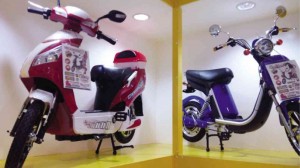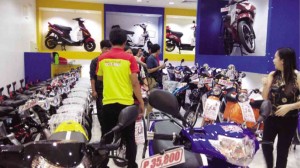E-bikes take to streets of Cebu City
CEBU CITY—Donal Cañares does not worry about the prices of gasoline or heavy traffic whenever he travels 10 kilometers every day from his house to his workplace in Barangay Banilad.
Cañares, 37, an employee of a private company, rides the Colton model two-wheeler he bought last year and has joined the legions of users of electric-powered bikes in the city’s crowded streets.
“It was a good purchase. The e-bikes run smoothly and it does not look like an ordinary bicycle at all. It’s like I’m taking a motorcycle to work,” he said.
E-bikes are now found in many city streets and their numbers are growing. These are distributed by CDR King, which opened a showroom in SM City at the North Reclamation Area on Nov. 8 to bring the products closer to the market.
‘California’
Article continues after this advertisementThe company also has a showroom and a service center on A. S. Fortuna Street in Banilad, Mandaue City, which opened in March 2013 when it first introduced the eco-bikes to the Cebuano market.
Article continues after this advertisementAlthough the bikes are made in Taiwan and China, their brand name is ‘California’ after the US state because of its “strong advocacy or thrust on green technology.”
“We want to replicate the same campaign in the Philippines,” said Diana Carlin Uy, CDR King area manager.
California eco-bikes are priced between P20,000 and P60,000, and come in at least 20 designs. The most recent model, Maybury, is sold at an introductory price of P65,800 and ideal for use in golf courses and resorts.
The bikes come with an integrated electric motor. These use rechargeable batteries which can be plugged in anytime. The light variety can travel up to 32 kilometers per hour (kph) while the high-powered ones can reach at least 45 kph.
A fully charged bike can go a distance of 50-60 km at a speed of 35 kph. Charging takes eight hours and costs only P2 to P5 per charging, Uy said. Both SM and A.S. Fortuna showrooms of CDR King have free charging stations.
No smoke, no sound
Because it is electric-powered, the bikes do not emit smoke or produce any engine sound. These have rigid frames with ABS plastic casing, durable alloy rims, ABS deck and frame, and LED speed indicators and headlight.
“It’s very ideal for flat terrain and short distances travel,” said Cañares, who bought his eco-bike in March 2013 for P19,000.
So far, he said, the bike has been cost-efficient because he barely felt any increase in his electric bill. He charges his Colton for about eight hours daily, usually at night so it will be ready
for use the next day.
Cañares recalled one instance last year when he was flagged down by Land Transportation Office (LTO) personnel because his bike did not have a plate number and was not registered.
No LTO registration
California eco-bikes are classified as bicycles and do not require LTO registration, according to Uy. Drivers need not secure licenses, and those using smaller models do not even have to wear helmets.
CDR King representatives had briefed officials of the LTO and the Cebu City Traffic Operations Management (Citom) about the eco-bike shortly after the product was introduced to the market last year.
Bringing the bikes to Cebu was also in support of the city government’s campaign to encourage the use of bicycles. On Oct. 29, the city council approved the Tindak Sugbo Lanes Ordinance sponsored by Councilor Nida Cabrera, which seeks the establishment of shared priority bike lanes or bike-friendly zones in the city.
Uy said most of their e-bikes are equipped with pedals so it can continue to run even if the motor runs out of electricity. Having pedals also give the users an option to bike around the city as one way of exercise.

